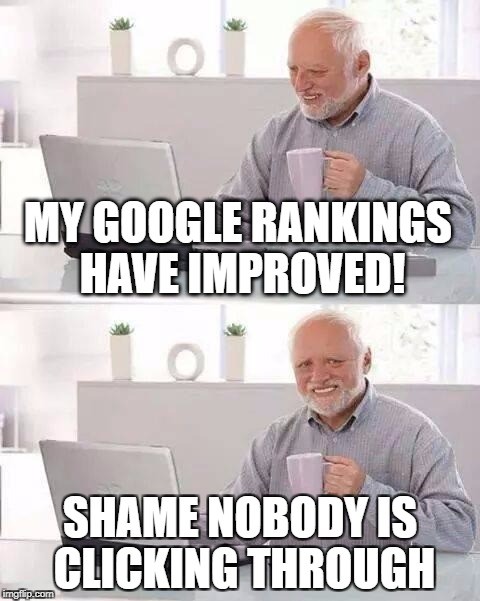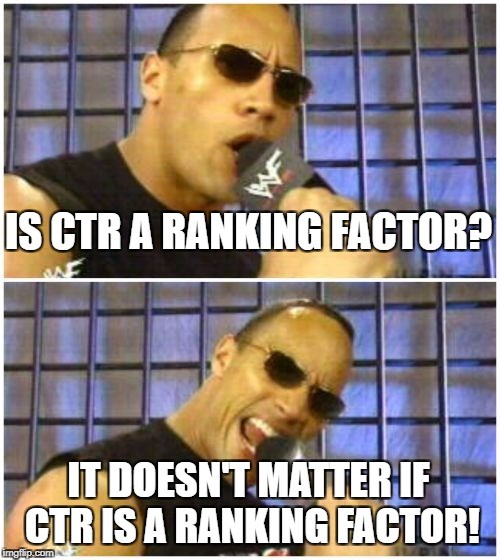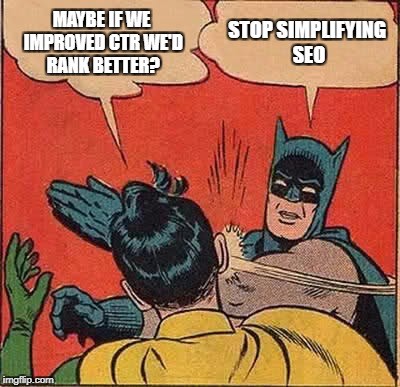

Posted In: Hidden by
Dan Howard,
August 27, 2015


Every year it happens: an agency, consultancy or service provider releases a definitive guide to what exactly Google is using as ranking factors right now. And every year it gets asked again, ‘does CTR affect ranking’. And every year, I bury my head in my hands and wonder why it even matters.
– So is CTR a Ranking Factor? –

This screengrab might be a little traumatic for a few of you. Imagine you’ve been A/B testing metadata for a site across a number of (largely) similar pages. You collect results over the period of a month, then eagerly compile your results. Will you have made an improvement?
Both sets win, but in different ways. Group A has improved the site’s rankings across a number of areas but users have given up clicking despite this. Group B has brought about a nice uptick in CTR despite fairly neutral ranking impact.
If CTR was a ranking factor, surely Group B would also have had a ranking boost too?
– So Optimise for CTR and You’ll Rank Better?-
Obviously this is an isolated example of 11 pages over 1 month, so don’t jump to any conclusions here. What’s more, each page is heavily location-specific, with differing levels of competition in each area of the UK. So it’s circumstantial evidence at best, and could well be impacted by other factors. But what about if we test this ourselves?
We’ve all read Larry Kim’s article on this topic, which saves us a lot of the leg work, and sheds some light on how complex the topic actually is. Turning to our own clients we measured the changes they saw in CTR & average ranking month on month for 5,194 key terms.
Testing whether improved CTRs would correlate with improved rankings showed that only 41.53% of queries that saw an improved CTR saw an improvement in rankings. Meanwhile pages that saw less than 0.1 change either way account for 16.1% of queries, and 42.37% actually saw negative ranking changes.
It looks like a dead heat, even hinting towards a negative correlation. And that’s before you start unpicking whether CTR increased because of ranking, or vice versa.
– Listen to The Rock-

Why does it matter if CTR is a ranking factor? Whether you’re appearing in a SERP 1st, or 21st, organically or via PPC, would you ever choose not to improve your CTR? Because, honestly, if you’re not trying to extract maximum value from every opportunity you’re getting, you’re being a bit lazy (or have far bigger issues to resolve).
It might seem odd for an SEO to say this, but as an industry we should stop worrying about whether what we’re doing will please Google. Work towards what makes clients successful instead and encourage users to click their results. Google visits your site more or less regardless of your content, but the people who put money into a business do not.
Of course metadata optimisation is still vital for helping search engines understand your site’s content, function, and appropriateness for a query. Nobody’s going to stop using keywords in their title tags, after all. But an SEO’s mantra should always be ‘Will this get more humans on my client’s site and converting’.
– If You’re Optimising for Humans You’re Optimising for Google –

I don’t work at Google, and we know how they like to keep their cards close to their chest, but here’s what we work towards at Boutique. Given how many times Google have said ‘optimise for humans’, perhaps it’s time we optimised for humans? And this means optimising to create brand consistency across touch points to create unified communications strategies, because this resonates with users making clicks and conversions more likely.
Google, ultimately, needs humans to enjoy using its products to retain an audience, and humans don’t stick around if your product sucks. This means we can operate on a very simple assumption: Google is working to make its ranking algorithm promote the most relevant, and likely content to provide a solution or receive clicks in every SERP. If it gave people awful results, or you consistently had to scroll to page 2 to find the best sites, they’d join Jeeves & Lycos on the farm next door.
– That Sounds a Touch Redundant-
It is, but people seem to ignore this all the time. Actual CTR can’t be the cornerstone of a ranking system: it’s far too easy to manipulate (shout-out to Blackhat World!) However, if you could calculate the likelihood of content to receive that click… perhaps that would be a prime suspect. And Google, with its ability to create filter bubbles for every user, is more than capable of judging how likely that Google user is to click certain resource types, products, and yes certain brands’ results.
So how about creating content that provides solutions, described in a way that encourages real users to visit your site and add value to your business? If you’re unsure how to do this, maybe get a group of experts in cross-channel communications to help you out. And if people value your content, and click the result, either Google will promote you because CTR is a ranking factor, or you’ll rank just as well as before, while making more money. I’m sure you’ll be happy either way.
– Yes, CTR Probably has Some Bearing on Ranking-
So yes, CTR (actual or predicted) is probably one cog in an enormously complex ranking system we cannot hope to understand. But it simply doesn’t matter whether it is or not, because there is no downside to optimising for CTR. So make great products, offer the right resources, and make it clear that you are offering users value, and you’ll likely succeed in search.